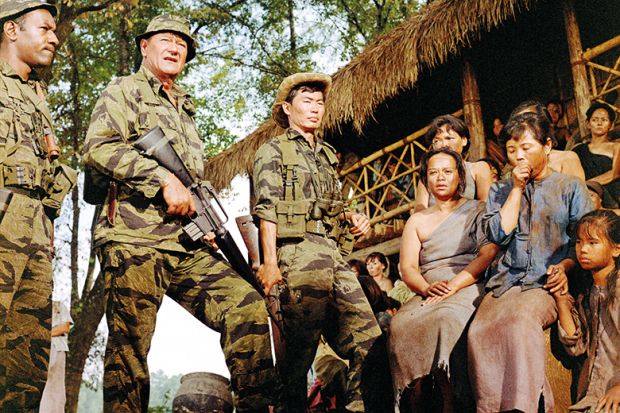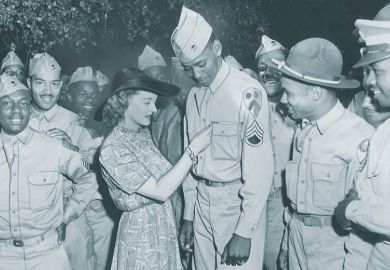Since 1968, the Vietnam War has been a key cornerstone of the genre in Hollywood features. In The Vietnam War on Film, David Luhrssen tackles 10 of the most obvious candidates, from the universally panned The Green Berets (1968), starring John Wayne, through to Werner Herzog’s Rescue Dawn (2007). A typical chapter proceeds by describing and analysing the plot, coupled with some contemporary context and reviews, before being followed by historical background. The accuracy of the depiction is then tested. The result is a solid discussion of this filmic decalogue. In this respect, the book provides a useful primer for students and scholars unfamiliar with the terrain. Beyond that, however, there are several frustrations.
First, and maybe this is unfair on a book of this kind, is the nature of its selection. While there is no disputing the inclusion of the films Luhrssen has chosen, it is those he has chosen not to include that is the salient point. He has picked films that directly represent an aspect of the war rather than those that were deeply influenced by it. For example, Franklin Shaffner’s Planet of the Apes (1968) is clearly a response to the war and the violence it generated both at home and abroad. Likewise, two years later, Robert Altman’s M*A*S*H (1970), while set during the Korean War, was clearly an allegory for the Vietnam War and its audiences would have understood that. Martin Scorsese’s Taxi Driver (1974) tackles the issue in terms of a returning veteran struggling with post-traumatic stress disorder. Moving ahead a decade to what Luhrssen calls “the most prolific era for Vietnam War movies”, namely the 1980s, Ted Kotcheff’s First Blood (1982) and George Cosmatos’ Rambo: First Blood Part II (1986) explore another returning vet – an interesting contrast to that depicted by Robert De Niro’s taxi driver – who returns to Vietnam to rescue MIAs in the sequel. On that note, what about the Missing in Action trilogy (1984, 1985 and 1988), starring Chuck Norris?
Second, films say more about the period in which they are made than the period they purport to portray. Each of the 10 films under discussion emerged at a different time and so responded to the domestic political situation at home rather than the period it represents. While set in 1968, Stanley Kubrick’s Full Metal Jacket (1987), which is discussed in the book, is a critique of that early 1980s nostalgic brand of Vietnam War film which attempted to cast the conflict as, in Ronald Reagan’s words, “a noble cause”. It was, in the director’s own words, an attempt to challenge that stereotype of hard-bodied American masculinity, as portrayed by Sylvester Stallone, John Rambo. Luhrssen could have said much more about the contemporary cultural context that motivated and influenced the production of each text.
A third weakness is that, by and large, none of these films except for The Green Berets is “explicitly prowar”. This overlooks – and hence gives a slanted view of – how the full range of Americans viewed that conflict. As Luhrssen correctly notes, The Green Berets is valuable “as a record of the attitude of prowar American conservatives”. More films like this would have been welcome.
Nathan Abrams is professor in film at Bangor University and the author of Stanley Kubrick: New York Jewish Intellectual (2018) and, with Robert Kolker, Eyes Wide Shut: Stanley Kubrick and the Making of HIs Final Film (2019).
The Vietnam War on Film
By David Luhrssen
ABC-CLIO, 208pp, £47.00
ISBN 9781440866722
Published 31 May 2019
POSTSCRIPT:
Print headline: Apocalypse through the lens
Register to continue
Why register?
- Registration is free and only takes a moment
- Once registered, you can read 3 articles a month
- Sign up for our newsletter
Subscribe
Or subscribe for unlimited access to:
- Unlimited access to news, views, insights & reviews
- Digital editions
- Digital access to THE’s university and college rankings analysis
Already registered or a current subscriber? Login








